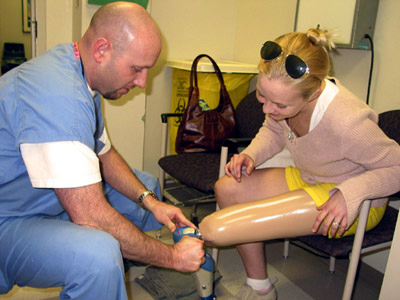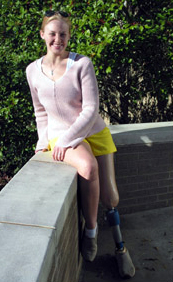Flowood, Miss.—Staff at Methodist Orthotics and Prosthetics were at her side when Margaret McCarty Duncan of Starkville took her first nervous steps on an artificial leg more than five years ago.
And when she underwent a more extensive amputation this past May, they traveled 200 miles to prep her for a new prosthesis.
So it made sense that they would be in on the preparations for her recent wedding. “She’s our extended family, no doubt about it,” said Jennifer Long, manager of the Methodist Orthotics and Prosthetics clinic in Flowood. “We’re excited for her. It’s so nice to see her happy.”
One source of Duncan’s contentment is the high-tech artificial leg that helped her march confidently down the aisle and into the arms of husband-to-be Gordan Duncan of Meridian on Nov. 19.
Methodist staff fitted the 24-year-old with the computer controlled Otto Bock C-Leg just a month after her May surgery. And she has been enjoying its improved fit and function ever since. “I remember saying: ‘It feels like Christmas,’ ” she said. “It was the first time in five and a half years that I felt comfortable.”
Duncan’s pain began the night of April 7, 1999, as the Mississippi State University student headed home to choreograph a routine for dance team tryouts. As she tossed some items in her car trunk, a drunk driver careened into Duncan. The impact pinned her between the two vehicles, “completely obliterating” her leg, said her mom Karen McCarty.
The accident closed the curtain on the aspiring dancer’s career plans and her resulting hospital stay uncovered yet another calamity. Doctors found she had a benign brain tumor. “In a way, the whole thing was a blessing,” Duncan said. “Surgeons removed the tumor, but I doubt it would have ever been found if I hadn’t been hospitalized.”
That ability to look on the bright side has stood Duncan well as she adjusted to an artificial limb. Because of the traumatic way her leg was severed, she had trouble finding a comfortable prosthesis.
“Margaret had a lot of painful scar tissue, very little bone beneath her knee and almost no padding on the end of her limb,” said Brad Kennedy, a certified prosthetist who makes and fits artificial limbs at Methodist’s Flowood clinic.
As staff at Methodist tried different components to ease Duncan’s pain, it became increasingly clear that equipment alone probably wouldn’t solve her problems. It appeared a mid-knee amputation might provide a better outcome, but Duncan was understandably reluctant to go under the knife again. “The pain I was in had been incredible, but I’m stubborn,” she said. “I didn’t want to lose my knee. It’s a huge decision to take that big a part of yourself.”
Duncan’s plight touched a chord with Kennedy. At age 17, he underwent an eerily similar tragedy. He lost half his left leg and a planned career in the Marines when a car plowed into him as he tried to push a friend’s disabled vehicle off the road.
Kennedy was able to remain highly active, thanks in part to his C-Leg. The innovative prosthesis features the world’s first computer-controlled knee and can be electronically fine-tuned to fit the wearer’s individual walking style.
Kennedy believed the state-of-the-art limb would help ease Duncan’s pain and expand her abilities, as well. But if Duncan opted for a C-Leg, surgeons would have to raise her amputation level—effectively putting an end to her dreams of dancing again.
“I was holding on to the idea,” admits Duncan, who had danced on her first prosthesis in a show that paired physically challenged performers with past winners from the International Ballet Competition. “But with the pain I was in, I realized that I wouldn’t be able to live a normal life.”
Duncan ultimately decided in favor of the amputation, and Long and Kennedy stood by in surgery as the procedure was done. While Duncan was still under anesthesia, they fitted her with an interim prosthesis.
Long said such early intervention encourages wound recovery. “The prosthesis compresses the limb, which helps reduce swelling and speeds up rehabilitation time,” she said. “Patients get to physical therapy quicker and they are able to bear their weight sooner.”
After about a month with her post-operative prosthesis, Duncan had her first C-Leg fitting in May. And she was soon back to balancing the demands of college life with the hectic schedule of a bride-to-be.
Duncan plans to start nursing school this fall in Meridian, a career choice that was motivated by her hospital experiences. “One of my first nurses would hold my hand when I was in the most excruciating pain and one time I remember her crying with me. That kind of compassion blew my mind. I want to be able to do that for someone. I want to help people like she helped me.”
Methodist Orthotics and Prosthetics—a division of Methodist Rehabilitation Center in Jackson—was one of the first sites in the nation to fit amputees with the Otto Bock C-Leg—the world’s first completely microprocessor-controlled artificial leg. The division is recognized by the American Board of Certification as a center of excellence and also serves as an accredited residency site for the National Commission on Orthotic and Prosthetic Education.


